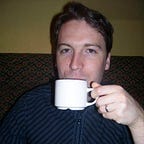How Much Reading is Too Much?
Is there a limit to how much you can read in a day? How do you strike a balance between consuming and creating?
For a while now, I’ve struggled with these questions. As someone who spends most of my day reading for both work and for pleasure, I wonder how much I can handle. When does too much reading lead to fatigue and information overload?
[caption id=”attachment_1746" align=”aligncenter” width=”300"]
“Bookshelf” | flickr | Germán Póo-Caamaño[/caption]
This question was raised by Kim Ukura at Book Riot (“Is it Possible to Read Too Much?”). Kim mentions a limit to how much she can read. For her, that limit hits at certain times of the year, usually in November. It’s as if she’s hit some limit to how many words her brain can handle at any given time:
For me, it feels like there is some sort of switch in my brain that turns to OFF once I’ve consumed a certain number of words, keeping me from reading more. No matter how many books I pick up or how excited I am to read, I can’t see to make my brain focus long enough to finish one for a few of weeks. And then, just as quickly, the slow down ends and I can read like a madwoman again.
Like Kim, I’m hitting my reading limits right now. I spend my work day editng, writing, and critiquing, so I’m always surrounded by words. I love the work I do, but it’s easy to reach my limit of too many words in a day. Late in the evening, I look at my stack of books and wonder why I’d want to read another word.
To Create or to Consume?
What’s the purpose of active reading, anyway? Is it to consume a product, in the same way we watch television or play a video game? Or is it to inform or inspire?
Ultimately, what are the outcomes of all that time spent in books? In his recent post at Critical Margins (“Games Not Grades”), Jason Braun said “it’s easier to read 100 novels than write one awful one.” I agree with Jason, but I also wonder if the purpose of reading is more than just passively consuming, like we do when we binge-watch The Walking Dead on Netflix or lose hours of our day playing Grand Theft Auto. I wonder if Jason has oversimplified this concept, suggesting you either spend your time reading 100 novels or write that awful novel.
I’d argue that reading those 100 novels will make writing that one awful novel a lot easier. I’d also argue the two activities work together in harmony, not in opposition. Reading 100 novels while writing might lead to one decent novel instead of an awful one. Reading is directly linked to creating. If you’re reading a lot (and that’s defined however you want), and you balance that with creative work, like writing, wouldn’t that lead to a better product?
A Mental Spring Clean
It’s when our creative time gets thrown out of balance with our consuming time that we lose sight of why we read. When we spend too much time reading and not enough time creating, our minds get lazy. I think Albert Einstein said something like that.
As Jason points out, making things and creating stories matters more than consuming. We are taught to consume, but we often forget that creating things reap better rewards, but require harder work.
Just like any other activity, it’s possible to reach a limit. Perhaps reading more than four novels a month isn’t always a good idea. Other times, it’s exactly what we need to jumpstart a writing project.
We have to flex our brain muscle, and we can’t expect consistent results. I learned this as a runner. At times, I can run miles and feel good about it, but at other times, a quick run exhausts me. It’s the same with writing.
Don’t feel bummed out if you don’t want to read or write at the end of the day. Just do what you can, and relax. Kim Ukura ends her Bookriot article by saying “a slow down [in reading] is a necessary, forced break. It’s a time to do some mental spring cleaning (regardless of the season) and get my reading life back in order — clear off some shelves, donate several bags of unwanted books, organize my holds list at the library.”
Not a bad idea, right? I know I’m facing this right now. It’s time to do my own mental spring cleaning, and categorize my reading priorities.
How will you organize your reading life? Have you faced the same issues?
Related articles
